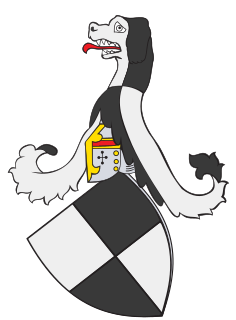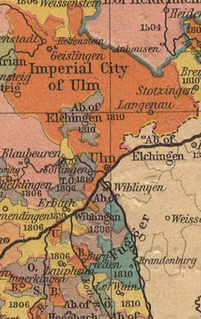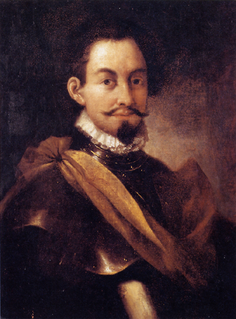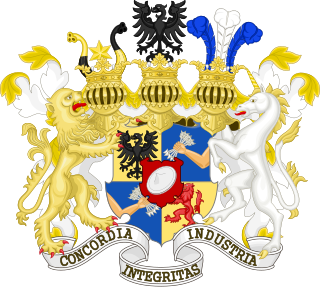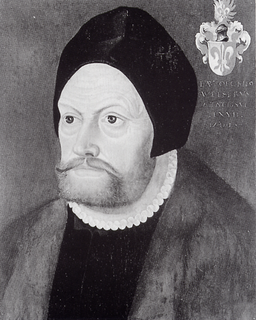
Carl Wilhelm Welser von Neunhof (31 December 1663 - 1 February 1711 Nuremberg), was a mayor of Nuremberg.

Nuremberg is the second-largest city of the German federal state of Bavaria after its capital Munich, and its 511,628 (2016) inhabitants make it the 14th largest city in Germany. On the Pegnitz River and the Rhine–Main–Danube Canal, it lies in the Bavarian administrative region of Middle Franconia, and is the largest city and the unofficial capital of Franconia. Nuremberg forms a continuous conurbation with the neighbouring cities of Fürth, Erlangen and Schwabach with a total population of 787,976 (2016), while the larger Nuremberg Metropolitan Region has approximately 3.5 million inhabitants. The city lies about 170 kilometres (110 mi) north of Munich. It is the largest city in the East Franconian dialect area.
He was the son of Carl Welser (born 6 April 1635) and Magdalena Barbara Schlüssfelder (born c. 1645 Nuremberg). He was married to Clara Sabina Kress von Kressenstein (born c. 1665) on 12 August 1689 in Nuremberg, and had a son Christoph Carl Welser, born 1690 in Nuremberg.
The Welser family were affluent merchants in Augsburg and Nuremberg since 1246, and were active in copper, silver and tin mining, owning and operating a large mercantile fleet and starting the spice trade with India. The family had agreements with the Spanish court, giving them a monopoly in the slave trade to Venezuela and the West Indies and the right to ship precious woods, dyes, gold and drugs back to Europe. These rights were lost with the abdication of Charles V in 1556.

Welser was a German banking and merchant family, originally a patrician family from Augsburg, that rose to great prominence in international high finance in the 16th century as financiers of Charles V, Holy Roman Emperor. Along with the Fugger family, the Welser family controlled large sectors of the European economy, and accumulated enormous wealth through trade and the German colonization of the Americas. The family received colonial rights of the Province of Venezuela from Charles I, King of Spain, in 1528, becoming owners and rulers of the South American colony of Klein-Venedig, but were deprived of their rule in 1546. Philippine Welser (1527–1580), famed for both her learning and her beauty, was married to Archduke Ferdinand, Emperor Ferdinand I's son.

Augsburg is a city in Swabia, Bavaria, Germany. It is a university town and regional seat of the Regierungsbezirk Schwaben. Augsburg is an urban district and home to the institutions of the Landkreis Augsburg. It is the third-largest city in Bavaria with a population of 300,000 inhabitants, with 885,000 in its metropolitan area.
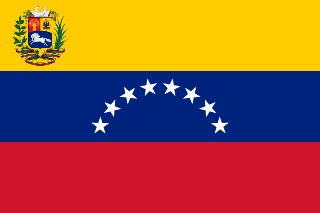
Venezuela, officially the Bolivarian Republic of Venezuela, is a country on the northern coast of South America, consisting of a continental landmass and a large number of small islands and islets in the Caribbean Sea. The capital and largest urban agglomeration is the city of Caracas. It has a territorial extension of 916,445 km2. The continental territory is bordered on the north by the Caribbean Sea and the Atlantic Ocean, on the west by Colombia, Brazil on the south, Trinidad and Tobago to the north-east and on the east by Guyana. With this last country, the Venezuelan government maintains a claim for Guayana Esequiba over an area of 159,542 km2. For its maritime areas, it exercises sovereignty over 71,295 km2 of territorial waters, 22,224 km2 in its contiguous zone, 471,507 km2 of the Caribbean Sea and the Atlantic Ocean under the concept of exclusive economic zone, and 99,889 km2 of continental shelf. This marine area borders those of 13 states. The country has extremely high biodiversity and is ranked seventh in the world's list of nations with the most number of species. There are habitats ranging from the Andes Mountains in the west to the Amazon basin rain-forest in the south via extensive llanos plains, the Caribbean coast and the Orinoco River Delta in the east.
